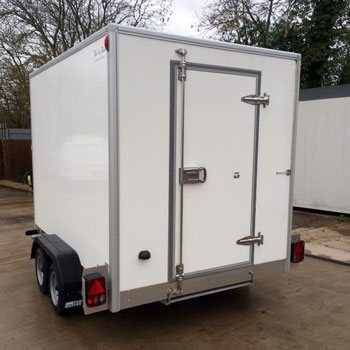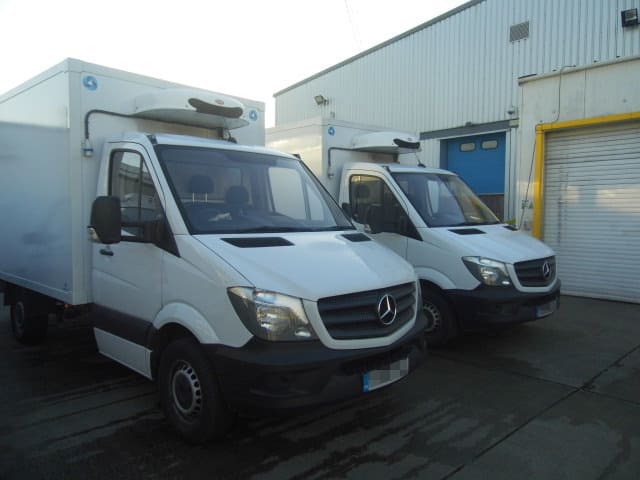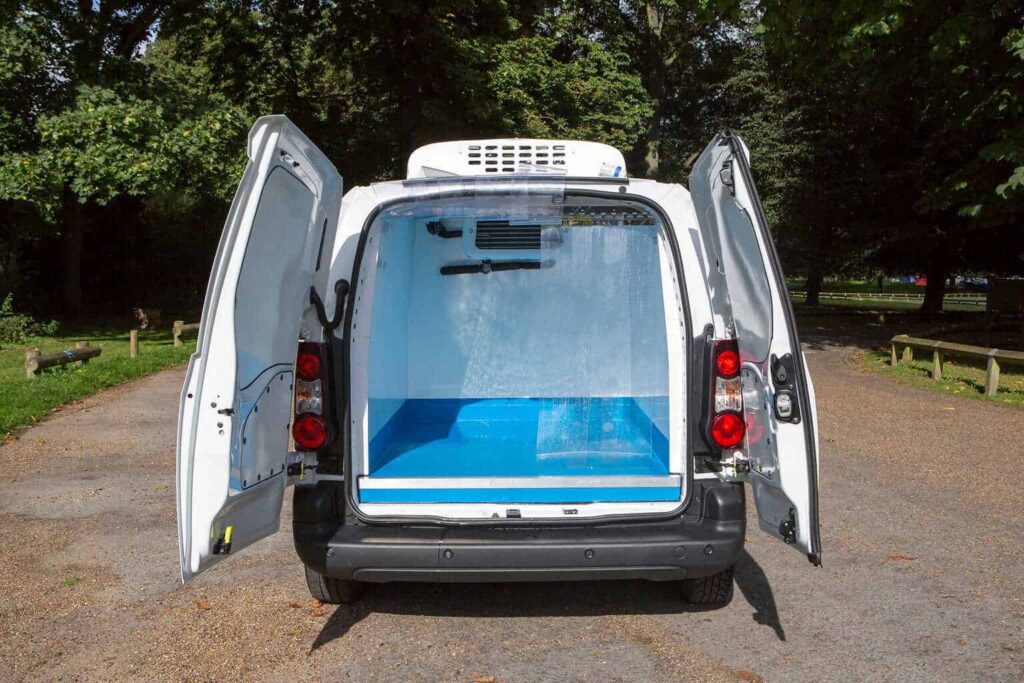Refrigerated trailers play a pivotal role in a multitude of industries, ensuring that temperature-sensitive goods are transported safely and efficiently.
These specialised vehicles are essential for the integrity of products ranging from perishable foodstuffs to pharmaceuticals, where even minor deviations in temperature can lead to significant losses or health risks. The ability to control climate conditions during transportation is not just a convenience; it is a necessity in our global economy.
Operations Director, Craig Diaz highlights the tailored approach, stating, “At FridgeXpress, we understand that each client has unique requirements. That’s why we focus on providing refrigerated trailers that are specifically adapted to meet those precise needs, ensuring optimal conditions for the cargo at every stage of the journey.”
Types of Refrigerated Trailers
Refrigerated trailers are crucial for transporting temperature-sensitive goods and vary significantly in design to cater to diverse industry needs. The primary types include single-temperature units, which are ideal for transporting large quantities of goods that require a uniform temperature setting throughout the journey.
In contrast, multi-temperature units feature compartments with individual temperature controls, allowing for the simultaneous transportation of goods requiring different conditions. This versatility is essential for suppliers who need to deliver a range of products, such as frozen foods alongside fresh produce, under optimal conditions within the same vehicle.
Check out our blog: How Does a Refrigerated Trailer Work?
Importance of Choosing the Right Size
Selecting the appropriate size of a refrigerated trailer is vital for several reasons.
- Firstly, efficiency is significantly impacted by size choice; a trailer that is too large for the cargo volume may lead to unnecessary fuel consumption and higher operating costs, while a trailer that is too small can result in overloading and frequent trips.
- Secondly, cost considerations extend beyond fuel efficiency to include maintenance and wear and tear, which are exacerbated by inappropriate size selection.
- Lastly, safety is paramount in the transportation of goods; an improperly sized trailer may not only lead to cargo damage but also pose risks on the road. Therefore, choosing the right trailer size is not just a logistical decision but a strategic one that affects the entire transportation process from packing to delivery.
Factors Influencing Trailer Size Selection
Determining the appropriate size of a refrigerated trailer begins with an accurate evaluation of the cargo volume and the nature of the goods being transported.
- Volume is typically measured in cubic metres, and the density and stacking ability of the products must be considered. For instance, densely packed frozen meats require less space than equal-weight leafy vegetables.
- Additionally, the type of goods impacts the choice of trailer due to varying temperature and humidity requirements. Perishables such as fresh produce may necessitate quicker transport and more precise temperature controls compared to more durable frozen items.
Transportation Requirements
Transportation specifics such as the distance to be covered, the duration of the journey, and overall logistical demands also dictate the size and type of refrigerated trailer needed.
- Longer distances might require trailers with more robust refrigeration capabilities or those designed for heavy-duty use.
- Additionally, if the delivery schedule is tight or requires multiple stops, the efficiency of loading and unloading becomes crucial, favouring trailers with easier access and better compartmentalisation.
Calculating Your Needs
It can be challenging to calculate what size trailer you need but the following tips should help.
Estimating Required Capacity
Calculating the necessary capacity for a refrigerated trailer involves several key steps:
- Determine the Volume of Cargo: Measure the volume of the cargo in cubic meters, considering the typical packaging and stacking configurations.
- Consider the Load Type: Assess whether the cargo is uniformly shaped or irregular, as this will affect how it can be stacked and thus the space required.
- Allow for Airflow: Ensure there is enough space around the cargo to allow for proper air circulation, which is vital for maintaining consistent temperatures.
- Account for Handling Space: Include additional space for handling equipment and personnel to move within the trailer safely.
By following these steps, you can estimate a trailer’s required capacity which ensures safety, efficiency, and compliance with transportation regulations.
Assessing Frequency and Regularity of Use
The frequency and regularity of your transportation needs are crucial in deciding the size of the refrigerated trailer. For businesses with daily deliveries, investing in a larger trailer may be more cost-effective to handle the volume efficiently.
Conversely, for infrequent use, it might be more practical to hire or lease a suitable trailer only when needed. This approach avoids the unnecessary costs associated with owning and maintaining a larger fleet than is typically required.
To assist in these complex decisions, Craig Diaz reassures potential clients: “Our expert team at FridgeXpress is well-equipped to help you analyse your cargo and transportation patterns. We provide customised solutions that fit perfectly with your logistical requirements, ensuring you get the most efficient and cost-effective refrigerated trailer options.”
With guidance from experienced providers like FridgeXpress, businesses can make informed decisions that optimally balance their operational needs with economic considerations.
Technological Features
The incorporation of advanced technology in refrigerated trailers significantly enhances their functionality and reliability.
One of the most crucial technological features is the temperature control system, which allows for precise regulation of internal conditions, critical for transporting temperature-sensitive goods.
Modern trailers are often equipped with remote monitoring capabilities, enabling operators to track and adjust temperatures in real-time, thereby ensuring the integrity of the cargo throughout the journey. This technology not only minimises the risk of spoilage but also provides data that can be used for improving future logistics planning.
Energy Efficiency and Sustainability
Energy efficiency and sustainability are increasingly important factors in the selection of refrigerated trailers. Choosing a trailer that is appropriately sized for the intended load is key to minimising energy consumption.
An oversized trailer consumes more fuel, whereas a trailer that is too small may need to work harder to maintain the required temperatures, also leading to increased energy use.
Furthermore, newer models of refrigerated trailers often feature more environmentally friendly refrigerants and improved insulation materials, which reduce the overall carbon footprint of transportation activities.
Opting for such models not only helps companies meet regulatory standards and reduce operational costs but also aligns with broader corporate ESG goals.
Check out our post: A Guide to Hiring a Refrigerated Trailer.
Where can people use Refrigerated Trailers?
Refrigerated trailers are versatile tools in the logistics sector, crucial for maintaining the quality and safety of goods across various industries. Below are some primary uses for these essential vehicles:
Events and Festivals
At large public gatherings such as music festivals, food festivals, and outdoor markets, refrigerated trailers are indispensable for storing large quantities of food and beverages at safe temperatures. They provide event organisers with the flexibility to store perishable items on-site, ensuring fresh and safe consumption throughout the event.
Pharmaceutical Transport
The pharmaceutical industry relies heavily on refrigerated trailers to transport medicines, vaccines, and other temperature-sensitive products. These trailers are equipped with precise temperature controls to meet strict regulatory standards, ensuring that vital medications remain effective and safe for use upon delivery.
Catering and Mobile Food Services
Mobile food businesses, including catering companies, use refrigerated trailers to transport and serve food at various locations. These trailers ensure that all food items remain at safe temperatures, reducing the risk of foodborne illnesses and enhancing the overall quality of the food served.
Private Functions
For private functions like weddings, anniversaries, and family reunions, refrigerated trailers offer a practical solution for catering services. They allow for the advanced preparation of meals and keep floral arrangements fresh, adding a layer of sophistication and professionalism to the hospitality offered at these gatherings.
Business Operations During Peak Periods
Businesses such as butchers, florists, and restaurateurs often face increased demand during peak periods like Christmas, Easter, and Valentine’s Day. Refrigerated trailers provide additional storage space to manage surplus stock efficiently, ensuring products remain in optimal condition and are available to meet consumer demands without compromising quality.
In each of these scenarios, the ability to control environmental conditions precisely is crucial, not only for preserving the integrity of the goods transported but also for adhering to health and safety regulations, thereby ensuring the success of the venture they support.
Choosing FridgeXpress
Opting for FridgeXpress brings numerous advantages that extend beyond mere refrigeration. A cornerstone of their service is the ability to customise solutions tailored to specific client needs.
Whether it’s for pharmaceutical transport requiring stringent temperature controls or food delivery that demands flexible scheduling, FridgeXpress provides precision-engineered solutions. Additionally, their exemplary customer support ensures that clients receive ongoing assistance and expert advice, making the logistics process smoother and more reliable.
Choosing the right size of refrigerated trailer is crucial for the efficiency, cost-effectiveness, and sustainability of transporting temperature-sensitive goods. FridgeXpress stands out as a leader in providing bespoke refrigerated trailer solutions that cater to diverse and specific needs.



